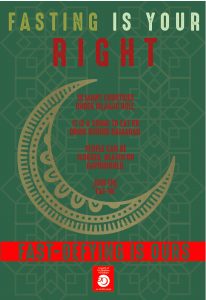Statement by Ex-Muslims International
The Reality of Ramadan: Coercion, Punishment, and Human Rights Abuses
Instead of a mandate, Ramadan should be a personal choice. Yet in many countries, failing to fast leads to severe legal and social repercussions. Laws in Saudi Arabia, Kuwait, the UAE, Qatar, Morocco, Jordan, Oman, Pakistan, and others criminalise public eating and drinking, with penalties ranging from fines and imprisonment to flogging.
Recent cases demonstrate the gravity of these laws:
These laws do not simply punish observant Muslims who break their fast but target ex-Muslims, non-Muslims, and those unable to fast due to health conditions.
The Disproportionate Suffering of Women
Women, particularly in Muslim-majority societies, bear a disproportionate burden during Ramadan. While men may fast and rest, women are expected to cook elaborate pre-dawn and post-sunset meals, even when they themselves are fasting.
Furthermore, many women are pressured to fast despite menstruation, pregnancy, or health conditions, putting their well-being at risk. In deeply patriarchal societies, women who do not fast face scrutiny, violence, and honour-based abuse, particularly if they are suspected of abandoning religion.
Exaggerated Health Claims and Dangerous Consequences
The myth that Ramadan fasting universally benefits health ignores the reality that forced fasting harms millions. Unlike controlled intermittent fasting, Ramadan involves prolonged dehydration, irregular eating patterns, and dangerous health risks for those with diabetes, chronic illness, or mental health conditions. The pressure to fast also affects individuals with eating disorders, exacerbating their struggles.
The Hypocrisy of Religious Enforcement
While strict Ramadan laws are imposed on the poor and vulnerable, wealthy elites and religious leaders often do not abide by the same rules. Many who enforce these laws privately eat and drink without consequence. This selective application of religious doctrine exposes the injustice of enforced piety.
End Forced Fasting, Arrests and Abuses: Our Global Call to Action
We demand that governments immediately cease the criminalisation of eating and drinking in public during Ramadan. Every individual, Muslim or not, should have the right to decide whether or not to fast without fear of punishment, ostracization, or violence.
We call for an end to the romanticisation of Ramadan which ignores the oppression it entails for millions. The world must acknowledge the harm caused by forced fasting and stand in solidarity with those who face persecution for defying fasting rules.

